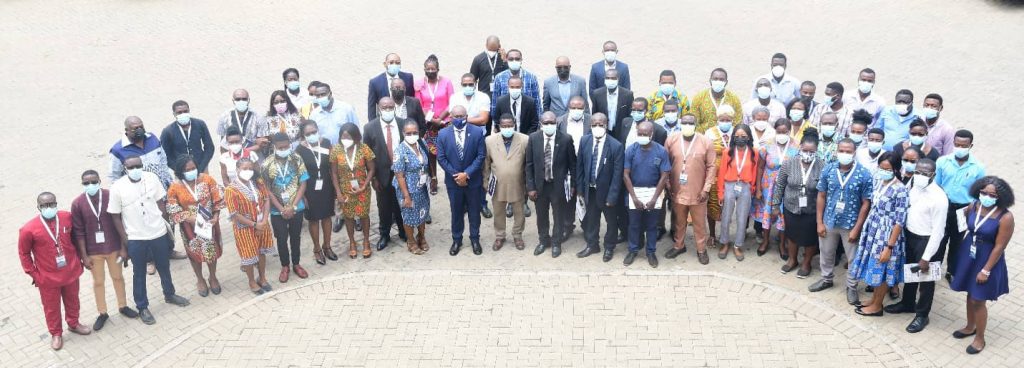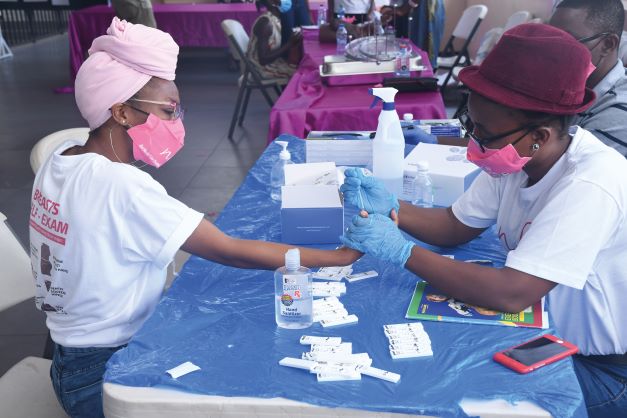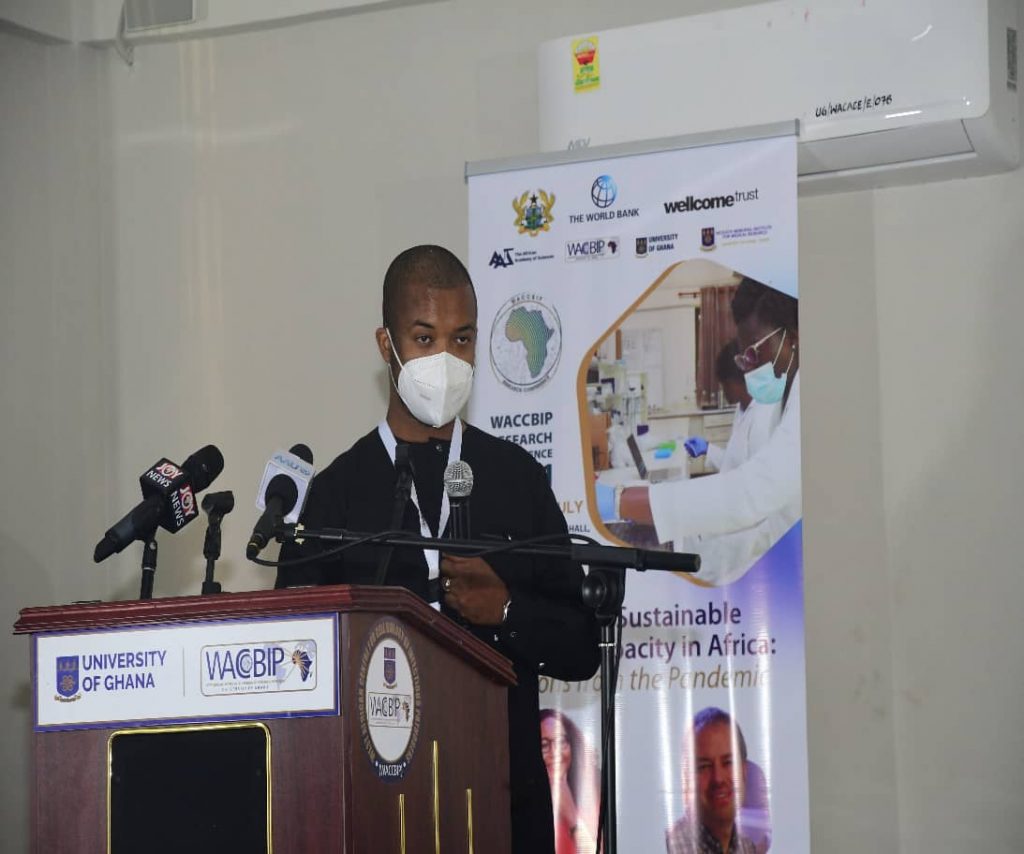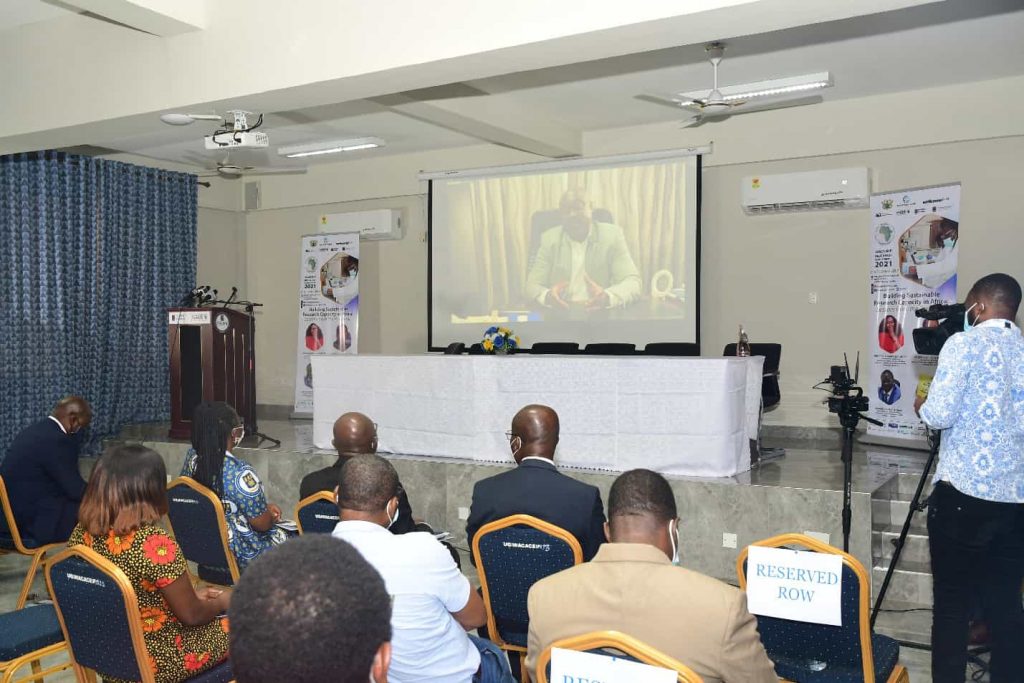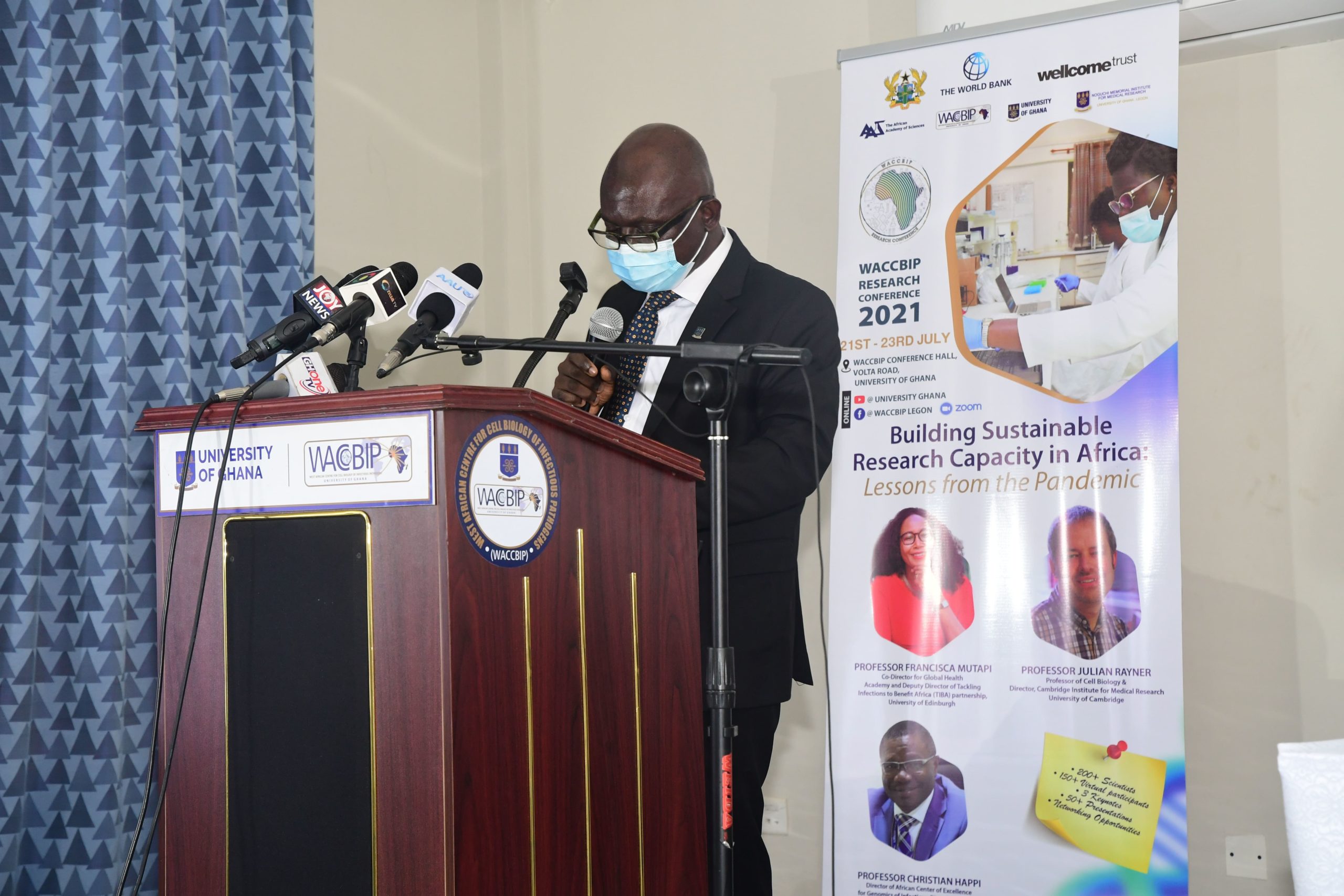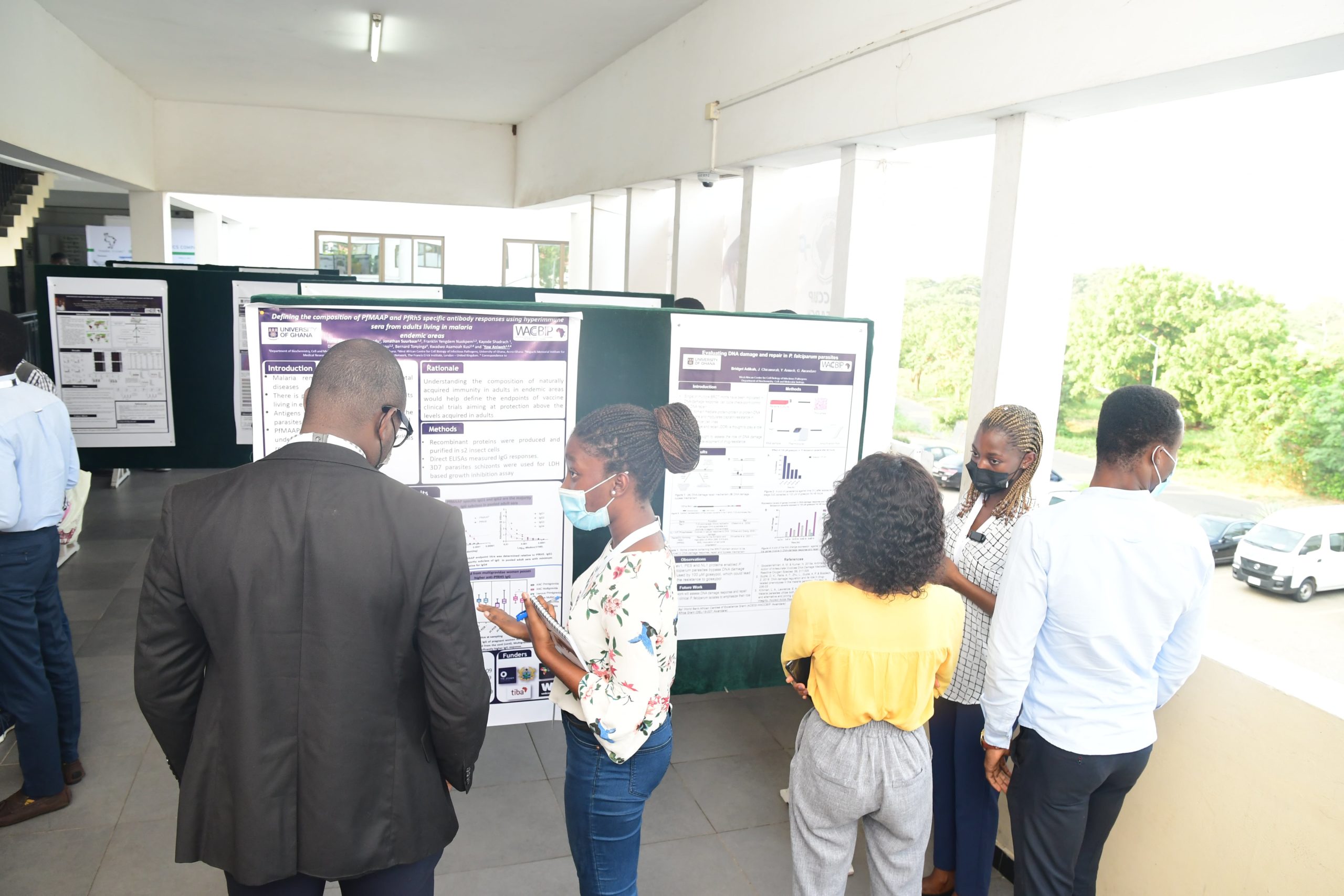News
5th WACCBIP Scientific Research Conference: Lessons from the pandemic
The West African Centre for Cell Biology of Infectious Pathogens (WACCBIP) held its fifth annual research conference in the conference room at the WACCBIP at the University of Ghana. The theme of the conference, held from July 21 to 23, 2021, was "Building sustainable research capacity in Africa: lessons from the pandemic".
This year's conference provided a valuable opportunity for young researchers trained at the Centre to network with world-renowned research scientists and industry professionals. Young researchers had the opportunity to showcase their expertise in new knowledge and new applications of technology to better inform public health stakeholders as well as drive the development of new disease diagnostic tools, drugs and vaccines, particularly in the context of the COVID-19 pandemic.
Global research leaders, including Professor Francisca Mutapi, Co-Director of the Global Health Academy and Deputy Director of the Tackling Infections to Benefit Africa (TIBA) partnership, University of Edinburgh; Professor Julian Rayner, Director of the Cambridge Institute for Medical Research, University of Cambridge; and Professor Christian Happi, Director of the African Center of Excellence for Infectious Disease Genomics (ACEGID), Redeemers University and WANIDA partner, delivered keynote speeches to over 350 in-person and virtual participants.
Also present at the event were high-level local and international dignitaries from academia and the political environment, including Professor Felix Asante, Vice-Chancellor for Research, Innovation and Development, University of Ghana; Professor, Abraham Kwabena Anang, Director of the Noguchi Memorial Institute for Medical Research (NMIMR), University of Ghana; Professor Eric Danquah, Director of the West African Centre for Crop Improvement (WACCI), University of Ghana and Professor Gordon Awandare, Director of WACCBIP. Others include Professor Tom Kariuki, Director of Programs at the African Academy of Sciences (AAS); Professor Emeritus Samuel Sefa-Dedeh, President of the Ghana Academy of Arts and Sciences (GAAS); Ms Himdat Bayusuf, Team Leader of the African Centers of Excellence in Higher Education (ACE) project; Dr Ahmed Jinapor, Deputy Director General of the Ghana Commission for Higher Education (GTEC); and Dr Anthony Nsiah Asare, Presidential Advisor on Health; all of whom made their remarks.
Professor Felix Asante, Pro-Vice-Chancellor for Research, Innovation and Development at the University of Ghana, who also chaired the opening session, highlighted the fact that the COVID-19 pandemic has put the spotlight on WACCBIP at both university and national development levels. He stressed that it was important for WACCBIP to be applauded for playing a central role during the most difficult times in the national response to containment measures and the fight against the pandemic. He added that WACCBIP's response to COVID-19 was a perfect demonstration of the Center's contribution to making the University of Ghana a world-class university.
"WACCBIP research is important for the current COVID-19 pandemic in Ghana. This research has provided key information on the current COVID-19 pandemic in Ghana, a more informed public health intervention including infection control measures and vaccine registries. With this achievement, WACCBIP has helped the University to acquire a strong research intensity."
He then encouraged the Center to share its history and successes with other University centers of excellence.
Officially opening the conference, Dr Anthony Nsiah-Asare, Presidential Advisor on Health, acknowledged the importance of WACCBIP's research in the fight against COVID-19. He expressed his satisfaction with the level of research conducted at WACCBIP, which he said was focused on specific local needs and provided key information on the current COVID-19 pandemic in Ghana, with a better-informed public health response and intervention strategy.
"I'm very happy to be invited this morning, especially at a time when the whole country is fighting against COVID-19. Thanks to WACCBIP, Ghana has been able to identify the different variants that have entered the country." He went on to say that "the President has formed a committee to ensure that Ghana becomes a vaccine producing country. We hope that with the private sector, we can do this as quickly as possible to enable the country to emerge from this pandemic. Covid-19 taught us a lesson, and what we've learned from it is that we need to be a self-sufficient country."
Dr Nsiah Asare was optimistic that Africa is capable of manufacturing most of its own vaccines, and that researchers can achieve this with the necessary support.
"We want to make sure of what the African Union has said, which is that by 2040 we should be able to manufacture around 40% of all our vaccines. We firmly believe that we have the men, the women and the researchers and that we can achieve this."
Senior researchers as well as doctoral and master's students from the Center took turns presenting their current research work to a global audience. Dr Peter Quashie, immunologist and senior researcher at WACCBIP spoke about his work on COVID-19. Speaking on the topic "A chronology of COVID-19 in Ghana: what the science tells us", he shared some important findings from WACCBIP's COVID-19 data collection process as part of the seroprevalence study, which aims to estimate, using serological analysis, distribution patterns and changes over time since the onset of the pandemic in the Ghanaian population. He explained that the process was necessary to track the community spread of the virus and trace infections across the country.
Other speakers and students presented cutting-edge research on topics in a wide range of biomedical science fields, including cell biology, drug resistance and discovery, vaccine discovery and development, human genetics and public engagement. Collaborators from top universities led plenary sessions and presented research data on diseases such as COVID-19. Visiting scientists and WACCBIP fellows presented their research findings on infectious and non-communicable diseases, including malaria, Buruli ulcer, tuberculosis, HIV/AIDS, cancers, sickle cell disease, hypertension, diabetes and SARS-CoV-2.
This year's conference was supported by a number of sponsors, including Inqaba Biotec West Africa Limited, Carramore International Limited, MES Equipment Limited, Agilent Technologies, DCL, MDS-Lancet, Bany Laboratories and Supplies, Arcoa Ghana, Cleanearth Scientific, YEMAACHI Biotechnology, YEBED, Satguru Travels, Resolve Systems Limited, Lab Companion and Special Ice.
Conference participants were impressed by the level of organization and the quality of the presentations. Mr. Jonathan Suubar, WACCBIP Master's Fellow, who also won the Best Oral Presentation Award (Masters category) at the conference, was exhilarated by the quality of the research presented and the flexibility to attend a conference during a pandemic.
"It's not only unique, but it offered us the opportunity to participate with some flexibility. Although many of us participated in person, we have the option of listening to the lectures again if we missed something. Everything is available on Facebook or YouTube. This made the conference unique," said Suubar.
"Looking at the various presentations we've had, we've had so many students presenting so many research projects, from viruses to bacteria, from parasites to public commitments. This is only the fifth conference, and by the time we get to the tenth, I'm sure we'll have some groundbreaking discoveries by researchers in Africa. The future of the WACCBIP conference looks bright."

